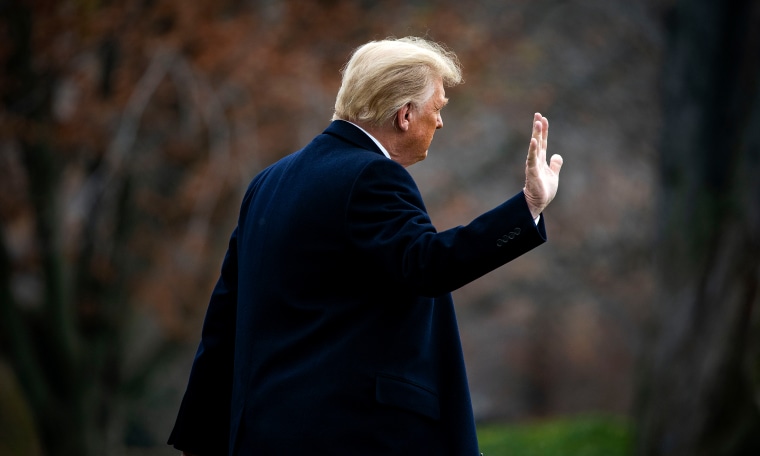Many are watching the New York County district attorney's criminal investigation into the financial dealings of former President Donald Trump and his businesses with bated breath. Will this be the moment that Trump finally faces real "justice" for alleged illegal behavior?
We are far from knowing the full extent of that investigation. But we do know some of the more likely charges could be hard to prove.
Perhaps not. Two points of serious caution. First, and perhaps obviously, no single criminal investigation will be able to right the many wrongs, both legal and perhaps illegal, that Trump committed over the past four years. We ask too much of the district attorney's investigation if we expect it to remedy the apparent abuse of power and breakdown in constitutional norms that Trump committed during his term in office. Second, even looking more narrowly at the potential criminal behavior being investigated by the district attorney, we are far from knowing the full extent of the investigation. But we do know that some of the more likely charges could be hard to prove.
Let's begin with the latest development in the district attorney's investigation. After an 18-month battle, the district attorney's office now has access to eight years of financial documents, amounting to millions of pages, from Trump and Trump's organizations. This is thanks to the Supreme Court, which finally denied Trump's last-ditch attempt to prevent his accounting firm from handing over this information. District Attorney Cy Vance is apparently looking into whether Trump inflated the value of his real estate properties to obtain loans and insurance benefits and deflated the value of those properties to obtain tax benefits.
But we need to be circumspect about the reach and force of this investigation and whether it will lead to criminal charges. Even if Trump or his businesses obtained varying and even inaccurate appraisals does not necessarily demonstrate fraud. Appraisers apparently use different standards and have a good deal of discretion when making their assessments. In addition, an appraiser or another outside person, not Trump himself, was the one performing these property valuations. This could make it challenging to connect Trump with any alleged fraudulent or otherwise improper activities.
While the crimes the district attorney's office is looking into may be different from allegations against Trump we have seen in the past, this is still history repeating. Many Americans followed investigation after investigation, waiting to see whether Trump or members of his family will ever be punished for alleged bad behavior — with little payoff.
We all watched the investigation by special counsel Robert Mueller into an alleged conspiracy between the Russian government and the Trump campaign and possible obstruction of justice. That was followed by an impeachment trial. No, not that impeachment — the first one, dealing with abuse of power and obstruction of Congress. This was, of course, followed by the second impeachment trial looking into whether Trump incited an insurrection in the Capitol. And that's to say nothing of the variety of congressional investigations opened during the Trump administration.
Looking to the present, there are now other potential ways that private citizen Trump, who no longer enjoys the protections of the presidency, may face legal exposure. Trump could be charged under federal law with incitement of violence based on the events of Jan. 6. But this would require proving, among other things, that it is beyond a reasonable doubt that Trump intended for violence to occur. In other words, it's a hard case to prove. Trump could also technically still face charges of obstruction of justice based on information detailed in the Mueller report. And there are still lingering issues of whether Trump violated federal campaign finance laws, largely based on information provided by his former personal attorney Michael Cohen.
On the state level, Trump is the subject of a criminal investigation in Georgia as to whether he violated election laws when he apparently pressured Secretary of State Brad Raffensperger to "find" enough votes to overturn the state's election results. He is also defending against a defamation suit filed by E. Jean Carroll in New York State court, which relates to her accusations that Trump sexually assaulted her decades ago.
In New York, Attorney General Letitia James is looking into whether Trump and his businesses are civilly liable for financial transgressions. James' investigation is likely to overlap with the criminal investigation being conducted by the district attorney's office.
And to be clear, none of this is normal. Former presidents do not typically face this level of potential legal liability.
Trump did enormous damage to our country. Some may misperceive this statement as a partisan one. It is not. It is about respect for the rule of law and basic norms that hold our grand experiment in self-governance together.
So it's not surprising that critics of Trump hope that this is the investigation, and this is the moment, when he faces real, concrete legal consequences for his actions. But Vance, for one, has his work cut out for him.
The district attorney is looking into something relatively narrow: criminal wrongdoing related to financial dealings. He is not looking into whether Trump abused the power of his office. Neither is the district attorney's office looking into how to strengthen or restore the guardrails of our democracy and preserve our constitutional protections. That work is now for the rest of us to take up.


